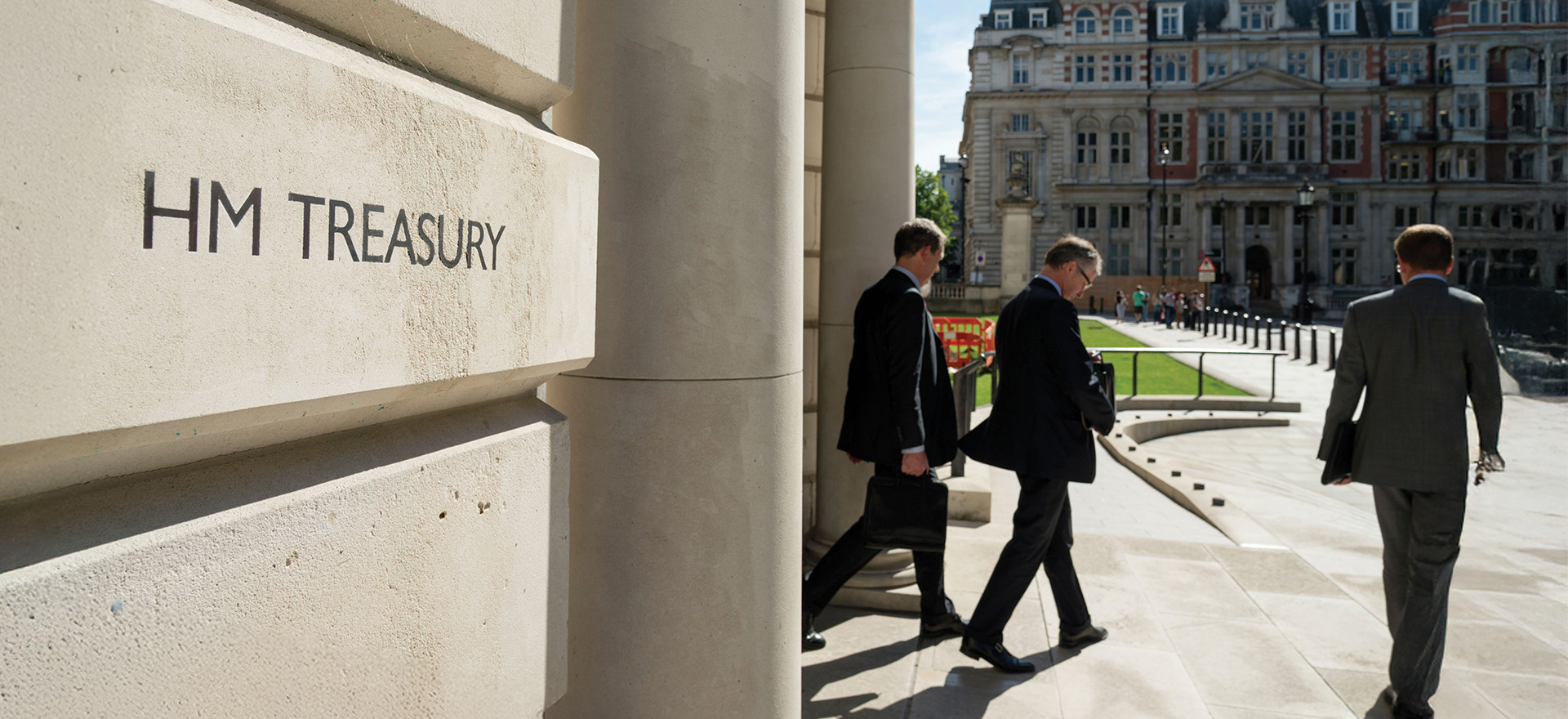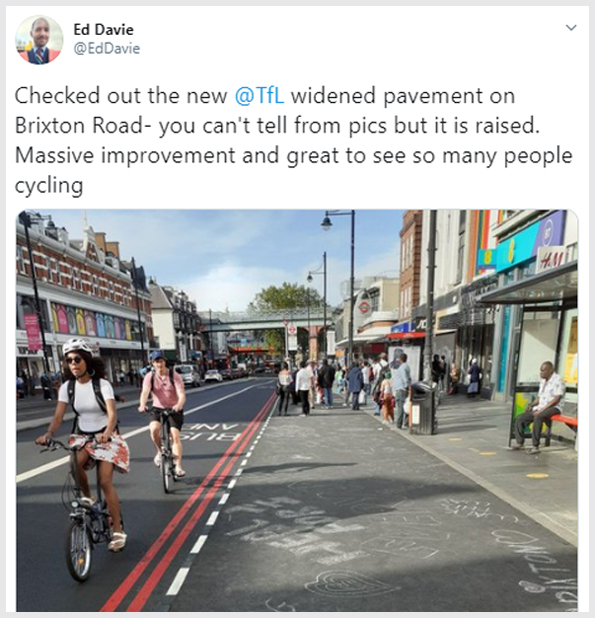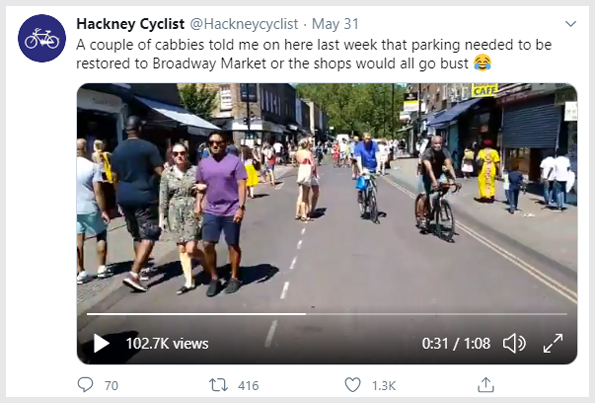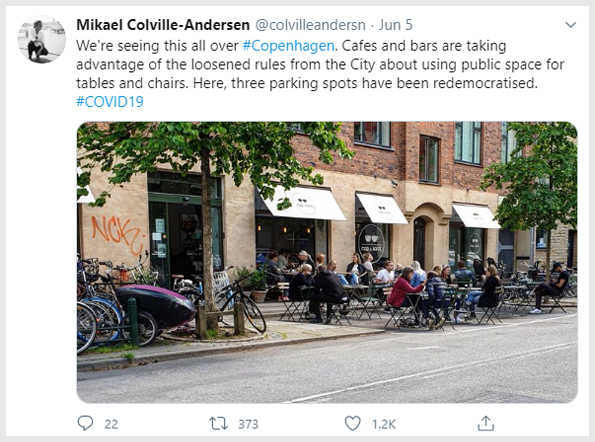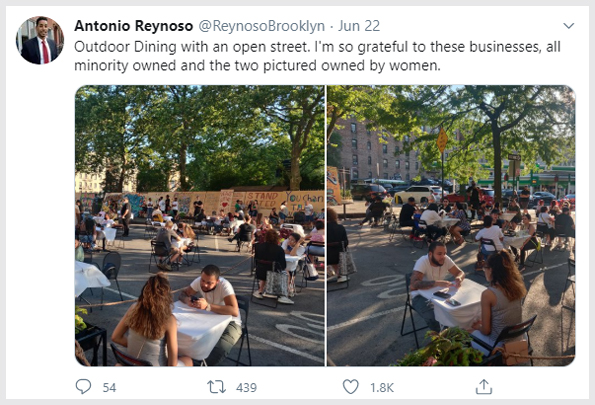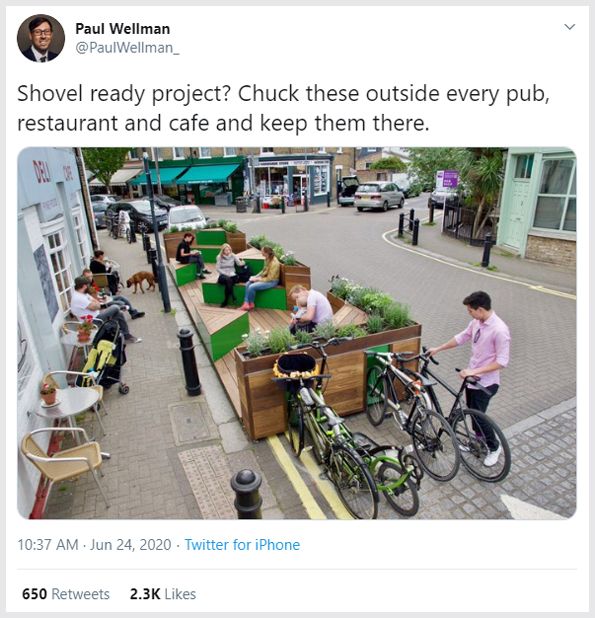The reopening of ‘non-essential’ shops on 15 June has provided the ability for the core of many town centres (shops) to reopen, albeit with social distancing measures in place.
While shops are a key component of all town centres and high streets and will undoubtedly continue to play a central role in their future landscape, a major component of town centre vibrancy and character are the food and beverage uses.
Restaurants and bars are meeting places and hubs for social activity: places where friendships are forged; couples fall in love; and business dealings are done. They have a strong emotional attachment for many of us – walking into your favourite restaurant or pub is like coming home.
There has been huge growth in food and beverage uses in recent years. This growth has been positive for our town centres – encouraging longer dwell times and making our high streets more liveable.
The impact of Covid-19 has been immediate and devastating for many aspects of commercial life. For town centres, high streets and destinations centred around eating and drink, entertainment and hospitality, the effects have been felt hardest. This threatens the very essence of place and what makes our town centres and high streets so special.
So, with this culture and way of life having been under threat, what is the route map out of the crisis and reversion to normality from 4th July? Is the longer-term repurposing of our high streets to support active travel unavoidable? And will this (weather permitting!) usher in a new wave of alfresco dining?
Active Travel & Temporary Measures to Improve the Public Realm
Coronavirus has brought the need to make town centres and high streets easily and safely accessible into sharp focus. For those with mobility issues or young children this has been known for some time. Where, in ‘normal’ times, you’d shuffle along a high street dodging and weaving as you go, the need for more space is now greater. Space which is often in short supply given the competing demands on high street spaces.
Following a review of social distancing measures, the
Prime Minister has set out that, where it is not possible to stay two metres apart, guidance will allow people to keep a social distance of ‘one metre plus’. This means
“staying one metre apart, plus mitigations which reduce the risk of transmission”.
Providing sufficient space for social distancing is a huge challenge for food and beverage operators. The relaxation of the ‘2m rule’ is a welcome and crucial change for pubs, bars and restaurants which revolve around close contact socialising and are often constrained by small unit sizes.
As explored in
Steven Butterworth’s blog, Transport for London (TfL) and boroughs authorities are rapidly reallocating road space in London to accommodate significant increases in active travel modes through the
Streetspace initiative. The Mayor’s Healthy Street policies and initiatives are in effect being accelerated to accommodate pandemic-based travel demands.
The Government’s guidance to support social distancing through the creation of Safer Public Spaces includes a number of ‘typical temporary interventions’ for high streets and town centres. These include:
- Widening footways;
- Introducing cycleways;
- Reducing traffic speeds;
- Provision of seating areas for the disabled and elderly; and
- Pedestrianisation.
For many town centres, these interventions are aspirational longer-term strategies in their own right. They have potential to make our town centres safer, more attractive and vibrant post-pandemic if they gain traction, public support and become embedded in the public realm. Many of the interventions are also key tenants of town centre planning and transport policy, site specific guidance and Area Action Plans.
TfL and many local authorities have acted swiftly. In London, TfL has widened the pavement widths in
Brixton to provide more space for pedestrians and Hackney Council has closed
Broadway Market to traffic to creating more space for pedestrians and cyclists. A
campaign to make changes at Broadway Market permanent has already been set up.
Brixton
Source: @EdDavie via Twitter
Broadway Market
Source: @Hackneycyclist via Twitter
In the short to medium term, the focus on promoting active travel and discouraging the use of public transport for all but essential journeys, may mean that we end up living our lives (and spending our money) more locally. For now, initiatives like this provide a boost in confidence that our local high streets are safe and open for business by creating the space needed to visit whilst respecting social distancing.
Optimising Outdoor Space: Alfresco Dining
Social distancing measures mean that restaurants and bars will need to operate at significantly reduced capacity (which will undermine viability for many) unless they are able to compensate for social distancing through the provision of additional seating areas beyond their demise or expansion of their customer base through takeaway services.
For one year (until 23 March 2021) temporary permitted development rights allow restaurants and cafes (Use Class A3) and drinking establishments (Use Class A4) to provide takeaway food (subject to notification). This swift action has allowed many businesses to take advantage of the new PDR and keep some income flowing throughout lockdown.
Depending on the location and design of outdoor seating areas planning permission and/or a licence may be required. This takes time, has risks and is often only permitted for temporary periods (usually one year).
With this in mind, MHCLG has
called on local authorities to accelerate licence approvals for the sale of takeaway food and drink outside of premises and refrain from taking enforcement action
“which would result in unnecessarily restricting outdoor stalls during this period”. Local authorities are also called on to explore opportunities for setting up more outdoor markets and identify whether
“closing certain streets to traffic could better support temporary markets and outdoor eating”.
The emerging
Business and Planning Bill will further ease the burden on operators by streamlining the licensing process for businesses wishing to put tables and chairs outside of cafes, bars and restaurants and by allowing
some operators to continue using outdoor seating areas without needing to re-apply for planning permission. The proposed temporary pavement licences process will simplify, speed up and reduce the costs of the consent route for outdoor seating (no more than £100), making it easier for people to safely drink and dine outside. Temporary changes to licensing laws will also allow many more licensed premises, such as pubs and restaurants, to sell alcohol for consumption off the premises – making social distancing easier.
In addition, proposed planning freedoms announced on 25 June “mean that proposals for outdoor markets, pop-up car boot sales or summer fairs will not need a planning application which will transform the way people shop and socialise”. Whilst the press release refers to these specific uses, the benefits are far broader – allowing use of land within the curtilage of a building for a wide range of activities and for an associated moveable structure to be erected.
In London,
Soho Estates is campaigning for Westminster City Council to allow the temporary pedestrianisation of parts of Soho so restaurants are able to offer outdoor seating (outside their land ownership on the public highway). The
Soho Summer Street Festival aims to reinvigorate much of Soho and lead the recovery of Soho as the cultural and vibrant heart of London.
For smaller asset manager or individual businesses, there is an urgent need for joined up thinking and for local authorities and/or Business Improvement District to support businesses by taking the lead in making our streets and public realm more alfresco friendly.
Internationally, many cities around the world have reclaimed streets (mostly from cars) to facilitate the expansion of restaurant and bars.
Copenhagen
Source: @colvilleandersn via Twitter
New York
Source: @ReynosoBrooklyn via Twitter
There are also innovative off the shelf solutions capable of being rolled out, such as the below modular ‘Parklet’ in Hammersmith and Fulham:
Hammersmith and Fulham
Source: @PaulWellman_ via Twitter
Takeaways
With the repurposing of road space, facilitation of active travel and reduced risk of enforcement action being taken, easing of lockdown will give rise to one of the biggest experiments in our town centres.
As we get use to this new way of life, some of these measures may become a permanent fixture, making town centres and high streets more accessible, liveable and pleasant spaces to spend time in.
Lichfields is well placed to help navigate this transition through assisting with
pavement licence applications, securing temporary worthwhile uses, and repurposing town centre sites to help breathe new life into high streets.
The 4th of July is set to become England’s ‘independence’ celebration too. Bring on the summer.
Other blogs in this series:

